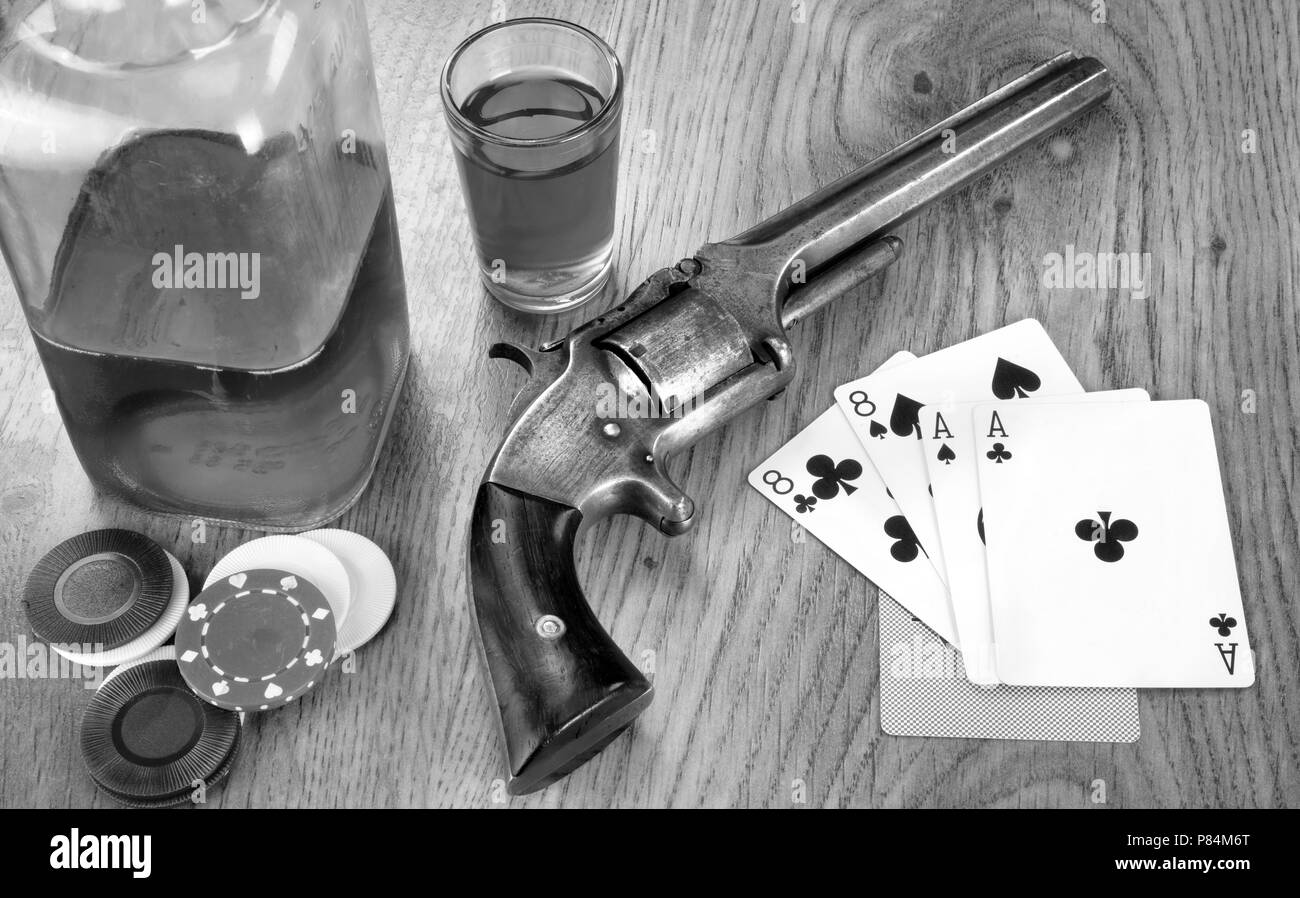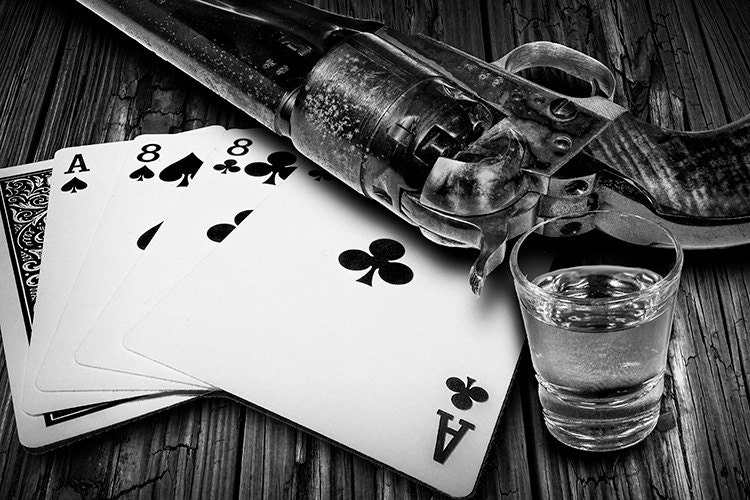Bill Hickok Poker Hand
Ever heard of the “Dead-Man’s Hand?”
The West was full of bad asses. Times were tougher back then and they made tougher people. Gunslingers prowled the streets, whiskey was safer to drink than water, everyone had venereal diseases, showers were a rare treat and it wasn’t unheard of to get your head blown off over a game of cards.
In this account, Hickok’s hand was A ♦ A♣ 8 ♥ 8♠ Q ♥ and included a drop of the deceased gunfighter’s blood. Although there is some doubt about the actual dead man’s hand’s fifth card, the consensus was—and remains—that Hickok died holding two pair of aces and eights. Voila, the dead man’s hand was born. The legend of 'Wild Bill' Hickok had come to an end. The poker hand he held at the moment of his death, of aces and eights, became known as Dead Man’s Hand. The West had claimed a link to Broome. It was, however, not a reference to Wild Bill Hickok's hand. Although the evidence is lacking, it is generally 'accepted' that Hickok's hand was A ♠, A ♣, 8 ♠ and 8 ♣.

Which, was exactly what happened one Wild Bill Hickok, in Deadwood, Dakota Territory, 143 years ago, today.
He went by many names: William, Bill, Duck Bill, Wild Bill, Shainghai Bill… he was called just about anything but his true name: James Butler Hickok.

And, let me tell you, this dude was about as gritty they come. He was a renowned gunman, lawman, serviceman, vigilante, bear-wrestler, actor, scout, and dueler; famous for his wit, his speed with a revolver, his flowing blonde hair and long frowning moustache.
The man, the myth, the legend: Wild Bill Hickok
No one knows exactly how many lives he took during his gunfighting days, but we know for sure he killed his first man at a train station, in “self-defense,” at 30 years old. Being a nice guy, Wild Bill paid the dude’s widow $35 for her troubles (which, in his defense, was all the money he had at the time).
Then, he went to go fight the damn rebel confederates in the Civil War, before embarking on a strange and duel-spattered career in law-enforcement. He marshalled towns, scouted, became a sheriff of Hayes, Kansas, and all the while he was busy killing fools, shooting criminals, trouble-makers, drunks, Indians and drunk Indians.
And Texans. Apparently, Wild Bill Hickok had thing against Texans (likely leftover animosity from his days fighting to preserve the Union).
Perhaps his most famous gunfight encounter was with a man named Bill Mulvey. Mulvey was drunkenly rampaging through Hays, Hikok’s town, shooting bottles and mirrors out of saloons, striking fear into the townspeople and claiming that he’d come to kill Wild Bill, himself.
Well, word of Mulvey’s debauchery reached Sherriff Wild Bill, and when Mulvey came for him, he was ready.
The drunken criminal was on horseback, charging, his rifle drawn and fully cocked, when Wild Bill stepped out into the street, waving his hands.
“Stop,” the Sherriff shouted, as if he was speaking to people behind Mulvey, “Don’t shoot him in the back, he’s drunk.”
Mulvey, hearing the Sheriff’s words, wheeled on his horse immediately, to face the fucker who would be so yellow-bellied as to shoot him from behind.
He realized Wild Bill’s trick, too late. The Sheriff pulled his gun with lightning speed, and blew Mulvey’s head straight off his shoulders.
Incidents like this seemed to follow Wild Bill everywhere he went. He was mauled by a bear once, attacked in saloons by soldiers he thought were his friends, won gun-fight after gun-fight, bested his enemies, and outsmarted those who would otherwise have him done in.
But on August 2nd (hey, that’s today!) of 1876, one of these incidents put an end to Wild Bill’s Wild West antics in a small town called Deadwood.
Bill apparently had a bad feeling when he entered that town, remarking to one of his friends as they entered it, that he thought he would be killed there.
Call it a prophecy.
On Bill’s first and last night in Deadwood (August 1st) he was hangin’ out at a local saloon. A spot opened up at a poker table and Bill sat down to play. Across from him sat the very man who would end his life, Jack McCall.
Well, McCall was apparently a pretty bad poker player. Or, at least, that night he was. Wild Bill whooped his ass so bad, that the famous gunman had to apologize to McCall, and even gave him money for breakfast the next day. Whatever people say about Wild Bill, at least he wasn’t a poor-winner.
Anyway, McCall didn’t take the loss very well. Despite Wild Bill’s apologies and breakfast donation, he was infuriated and insulted by the loss and the next night, the night of August 2nd, McCall returned to that saloon, walked right up behind his nemesis and pulled out his Colt .45 single action.
“Damn you! Take that!” McCall shouted, as he pulled the trigger.
Wild Bills head exploded all over the poker table. The bullet exited through his left cheek and hit the man sitting across from Hikok in the wrist. The famous gunslinger slumped over the table, dead, still holding his cards: two black aces, and two black eights.
A hand that would become known to history as the “Dead Man’s Hand.”
The 'Dead Man's Hand.'
Wild Bill Hickok Poker Hand
So ended the adventures of one of the West’s greatest heroes.
Bill Hickok Poker Hand
That was today, in history.
The Death of Wild Bill Hickok, by D. J. McAdam.

There are a number of poker hands that are famous for one reason or another, but perhaps the most sinister is the Dead Man’s Hand, so named because it was the hand held by James Butler “Wild Bill” Hickok when he met his untimely demise.
The incident occurred in Deadwood Gulch, in the Black Hills of the Dakotas. Gold had been found in the region in 1874, leading to the establishment of the town. There is a tradition that, when Hickok first laid eyes on the place, he had a premonition that he would not leave town alive.
Whether or not that is true, it can be verified that Hickok was playing poker in Nuttal and Mann’s saloon on August 2nd, 1876. A man by the name of Crooked Nose McCall approached Hickok and shot him in the back of the head. Theories as to McCall’s motive vary; some say that he was simply drunk (not too uncommon in those days, and those environs), while others speculate that he may have been hired to assassinate Hickok before the latter could be appointed sheriff of Deadwood and bring law and order to its citizens. The shot was fatal, and Wild Bill Hickok slid to the floor, still holding his cards.
Poker back then was draw poker, and so Hickok would have had five cards in his hand: two aces, two eights, and a queen.
Wild Bill Hickok Death Poker Hand
There are a few unimportant additions and variations in some accounts. Some say that all five cards were black, others that the fifth card (the kicker) was a ten, not a queen. But all agree that Hickok was holding a pair of aces and a pair of eights when he was shot, and that combination has become known as the dead man’s hand. There are superstitious poker players to this day who will not play a hand with a pair of aces and a pair of eights.